“The peculiar evil of silencing the expression of an opinion is that it is robbing . . . those who dissent from the opinion, still more those who hold it. If the opinion is right, they are deprived of the opportunity of exchanging error for truth: if wrong, they lose . . . the clearer perception and livelier impression of truth, produced by its collision with error.”
—John Stuart Mill, On Liberty, Ch. 2. (1859)
“The worst of all tyrannies is the tyranny of the majority.”
—James Madison, Federalist, 10
AP Images
For a devout post-modernist, open discussion is subordinate to a single-minded pursuit of justice. Long a debating point within elite universities, post-modernism escaped, like a laboratory leak, into the real world of Covid politics at the beginning of this decade. To protect innocents from harm, our thoroughly post-modern masters silenced dissent and encouraged falsehoods. Public health officials took upon themselves the burden of convincing parents and politicians that schools must be closed, masks worn, and social distancing practiced—even when supporting evidence was thin at best. Those who objected were denied platforms in legacy and social media outlets.
As they tell this story in their new book, In Covid’s Wake, Princeton professors Stephen Macedo and Francis Lee hoist their flag to John Stuart Mill’s standard. A democratic republic that denies itself discourse about the central issue of the day risks becoming a tyranny of the majority, they argue. Suppression of dissent proved to be the worst of all Covid co-morbidities.
In their account, tables and figures show the extent to which government and citizen responses to Covid’s spread were driven more by politics than science. Democratic governors and mayors locked down businesses, closed school doors, and imposed restrictions on general assemblies; Republican leaders did not. As masks were worn in parks and wildlife reserves in California, motorcyclists rode through the hills and plains of deep-red South Dakota in the Covid summer of 2020 to the dances and beer festivals of Sturgis. Democrats wore face masks, refused to shake hands, and took wide circles to avoid meeting one another; Republicans tossed the masks away while embracing. Democrats tested themselves each time the sun came up; Republicans searched for the double-red line only when forced to do so. Democratic citizens got double vaccinations with a third booster shot; Republicans became increasingly hesitant.
To read more of my reflections about In Covid’s Wake, see my full book review at Education Next.
Paul E. Peterson is a senior fellow at the Hoover Institution and the Henry Lee Shattuck Professor of Government at Harvard University.




